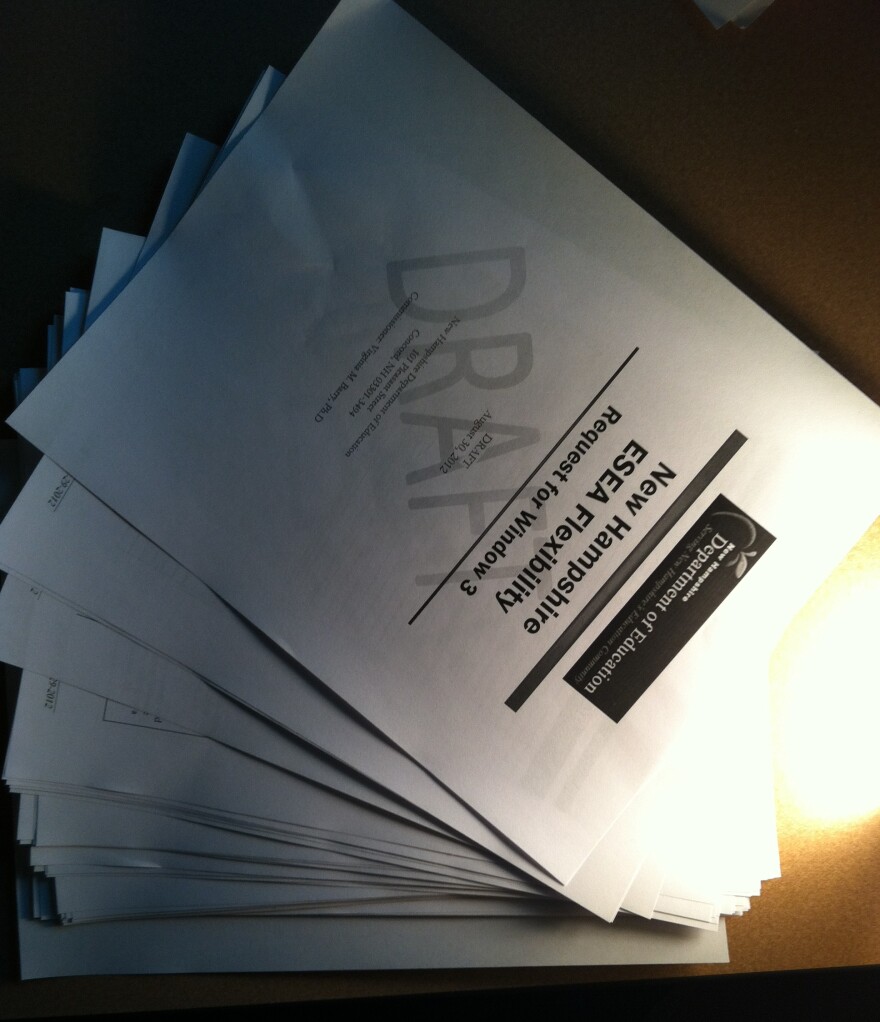The New Hampshire Department of Education is finalizing a waiverfrom the rules imposed on New Hampshire by No Child Left Behind. While pieces of the proposal have been in the works for some time, it’s unclear how much of what’s in the waiver will actually end up in local schools.
For eleven years, No Child Left Behind, or NCLB, has ruled the way educators taught kids in New Hampshire. It requires that 100 percent of students have to perform at grade level in reading and Math by 2014 in order for schools to receive federal dollars.
Here’s how then-President George W. Bush described the law in 2007.
Bush: It is a national objective and important national goal to make sure every child realizes his or her full potential. And that is the whole philosophy behind the No Child Left Behind Act.
But of course, that’s not how everyone sees the law.
Joyce: from the beginning we saw No Child Left Behind as really reducing the scope of education to a very narrow field. And also it was based on a very faulty student assessment notion, that our tests that were existent at the time were actually true measures of every individual student’s work.
Mark Joyce from the New Hampshire School Administrators Associationsays his group has been opposed to NCLB since the beginning, in 2002. At the time, that was a heretical stance to take, but in the intervening years opposition to the law has piled on.
And now says Paul Leather, Deputy Commissioner of Education, New Hampshire educators finally get to see what relief might look like.
Leather: We’re building on a system where local schools can build on the things where they have their strengths, where they can recognize their weaknesses, and build a system from there … where there are local decisions and local choices. It’s not one size fits all.
To be granted a waiver from NCLB states first have to adopt college and career ready standards: meaning schools have to prove that they are preparing students for jobs or higher ed. New Hampshire does this by adopting the Common Core Standards– a set of shared benchmarks that have been taken up by 45 states – in 2010.
Second, states have to lay-out how they will identify and improve low-performing schools. New Hampshire will begin transitioning to the Smarter Balanced assessment – a test being used by 25 other states that is aligned to the new Core Standards – next school year.
Department of Ed officials will use that and other measures to determine which schools are the lowest performers. It can then concentrate on improving those schools with targeted professional development, instead of cutting their funding.
The third area, which includes teacher evaluations, has perhaps been the most controversial. Already, the state requires that schools evaluate teacher performance, but there’s no standard way of doing so.
Leather: there’s been a lot of criticism of this element nationally, because some systems that first came out of the box if you will, were not designed based on the best research
The DoE’s Paul Leather says for the waiver, New Hampshire has designed a model system of teacher evaluation, cherry picking the best methods from around the country. It includes observation of teachers by superiors, scoring of a professional portfolio, and measures that show how well a teacher improves student test-scores.
Leather: We think we’ve built a system that really will be considered to be a value to our local schools, districts and school boards.
But here’s the catch, much of what’s in the waiver is optional, and even though many decision makers are on board, including the teacher’s union, many schools may not adopt the model.
Here’s president of the New Hampshire chapter of theNational Educators Association, Scott Mcgilvray.
Mcgilvray: We may have the best tool in the world, it’s whether or not the local communities want to take the time and effort and money to properly fund an evaluation tool.
In other words, if New Hampshire is granted a waiver, it’s not clear how much will be changed.
But Mark Joyce of the School Administrators Association says that’s perhaps beside the point.
Joyce: I think students are already experiencing the change.
He says the changes asked for in the waiver began in New Hampshire years ago, when many of these reforms kicked off.
And those changes will continue, whether the Feds grant flexibility from No Child Left Behind, or not.



